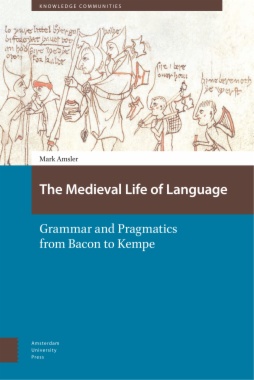The Medieval Life of Language: Grammar and Pragmatics from Bacon to Kempe explores the complex history of medieval pragmatic theory and ideas and metapragmatic awareness across social discourses. Pragmatic thinking about language and communication is revealed in grammar, semiotics, philosophy, and literature. Part historical reconstruction, part social history, part language theory, Amsler supplements the usual materials for the history of medieval linguistics and discusses the pragmatic implications of grammatical treatises on the interjection, Bacon’s sign theory, logic texts, Chaucer’s poetry, inquisitors’ accounts of heretic speech, and life-writing by William Thorpe and Margery Kempe. Medieval and contemporary pragmatic theory are contrasted in terms of their philosophical and linguistic orientations. Aspects of medieval pragmatic theory and practice, especially polysemy, equivocation, affective speech, and recontextualization, show how pragmatic discourse informed social controversies and attitudes toward sincere, vague, and heretical speech. Relying on Bakhtinian dialogism, critical discourse analysis, and conversation analysis, Amsler situates a key period in the history of linguistics within broader social and discursive fields of practice.
- Cover
- Table of Contents
- Acknowledgements
- Abbreviations
- Introduction: Where is Medieval Pragmatics?
- 1. Medieval Pragmatics: Philosophical and Grammatical Contexts
- Three Terms and a Theory
- Roger Bacon’s Semiotics and Pragmatics
- Peter (of) John Olivi: Pragmatics and the Will to Speak
- 2. Interjections: Does Affect have Grammar?
- 3. Allas Context
- Allas: A Case for Context
- 4. Alisoun’s Giggle, or the Miller Does Pragmatics
- Does a Giggle Mean?
- Impoliteness, Hedging, and Textual Pragmatics
- Polysemy, Bullseyes, Misfires, or How Narrative Escapes Intention
- Centrifugal Narrative Contracts
- 5. How Heretics Talk, According to Bernard Gui and William Thorpe
- Pragmatic Talk, Pragmatic Action
- Bernard Gui’s Conversation Analysis and Institutional Discourse
- William Thorpe’s Relationship Pragmatics
- 6. Margery Kempe’s Strategic Vague Language
- Cooperate or Else
- Vaguing Pragmatics
- Kempe Comes to the Archbishop
- Kempe Tells a Tale
- One More Thing
- Bibliography
- Index
- List of Images and Tables
- Images
- Image 6.1 Oak pulpit
- Image 6.2 Luther, Passional Christi und Antichristi (Wittenberg, 1521), pp. 18-19
- Tables
- Table 3.1 Allas in Chaucer’s Knight’s Tale
- Table 3.2 Allas in Chaucer’s Miller’s Tale

